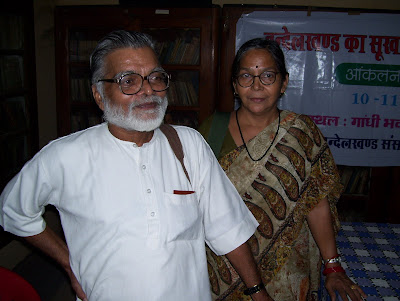Traveling through Bundelkhand, this question repeatedly comes up in conversation. Is drought a recent phenomenon or is this something that has always been a part of this region? In an attempt to get the perspective of local intellectuals and social activists, we seize on an opportunity to attend a conference on the drought organized by Dr Bharatendu Prakash at Chhatarpur. Dr Prakash is an unconventional scientist, having quit academic research at IIT Kanpur back in 1974 and embraced rural development activities through the medium of non governmental organizations. In the past, he has co-authored a study on the water resources of Bundelkhand sponsored by the Government of India. Today, he is a leading activist of the Organic Farming Association of India and is also working with the MP Council of Science and Technology on a detailed village by village survey of water resources in MP’s Bundelkhand region.
The conference is being attended by activists from different districts of Bundelkhand – both from UP and MP and is being held at the Gandhi Bhavan in Chhatarpur. The speakers concur on the causes of the current crisis and their view goes something like this. Historically, Bundelkhand has been periodically subjected to drought. This being the case, the people have evolved over time elaborate mechanisms to cope with the drought. What has changed in recent years is that the traditional coping mechanisms have fallen apart. The problem is not so much the shortfall in rain – officially called meteorological drought – rather it is the reduced ability of the people to cope with such a shortfall.
Dr Bharatendu Prakash ,Vikram Sarabhai fellow at the MP Council of Science & Technology has been studying the water resources of Bundelkhand from many years.
What were these coping mechanisms?









